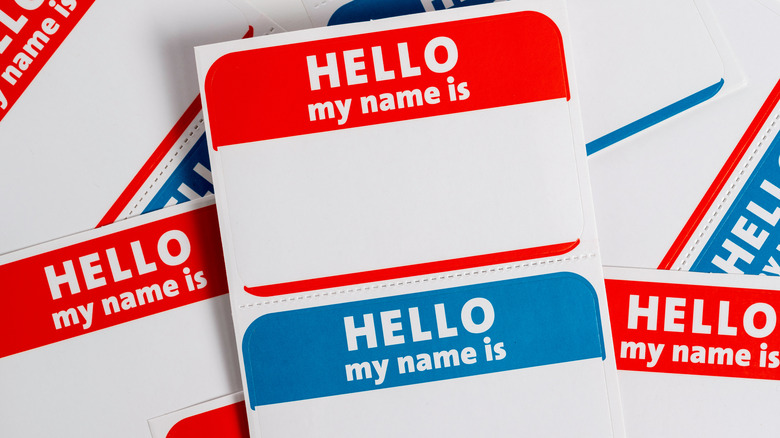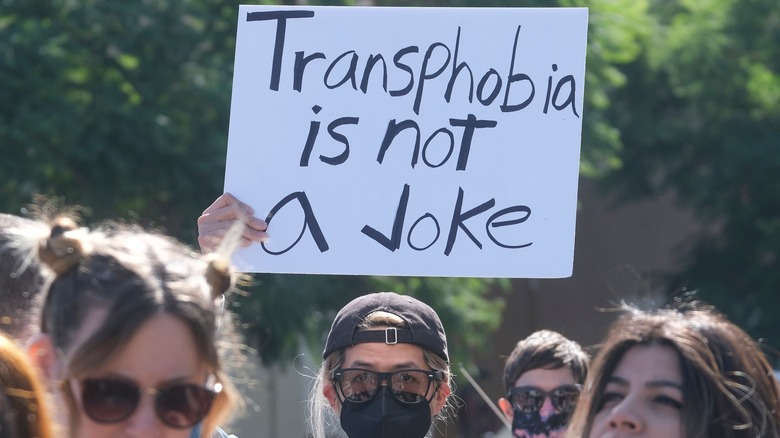What Is Deadnaming, And Why Can It Be Harmful?
Society's understanding and acceptance of gender and sexuality are always evolving, and for many, that is considered a good thing. More people now feel comfortable identifying as LGBTQ+ than in the past, according to a 2022 Gallup poll. With this evolution comes new language to discuss gender and sexuality in an inclusive and empathetic way.
One example is "deadname," a relatively new term that entered the general lexicon after Caitlyn Jenner came out as a transwoman in 2015. According to Google Trends, the term has shot up in online searches again recently, following a Twitter controversy where an author was suspended from the social media platform after deadnaming actor Elliot Page (via Pink News).
Though celebrities have (often inadvertently) thrust the concept of deadnames into the spotlight, they aren't the only ones impacted by deadnaming — trans and non-binary people all around the world experience this harmful microaggression. So what is a deadname, and why does deadnaming hurt non-cisgender people?
What is deadnaming?
Many trans and non-binary people wait years before coming out of the closet if they do at all. When they do share their gender identity with the people around them, it can feel like a rebirth, complete with a new name to affirm who they really are. Their previous name is often referred to as their "deadname," and calling them by this name is "deadnaming." The term came about because, as psychiatrist Jason Lambrese, MD, told Cleveland Clinic, "The person who they once were is dead, but the new person is alive."
Choosing a new name can be empowering for those who don't identify with their assigned gender. According to Teen Vogue, a variety of factors influence how transgender people select their monikers. Traditional meanings, how masculine or feminine a name sounds, and favorite fictional characters are some of the sources of inspiration when picking a name. But there's one thing trans people say their new names have in common: they reflect the person they're becoming.
Why is deadnaming harmful?
Healthline notes that deadnaming isn't always intentional or malicious. Sometimes it happens when a family member uses the deadname out of habit or when hospital staff checks a trans person's driver's license, for example. Still, deadnaming can have both mental and physical repercussions.
Medical News Today explains that referring to someone by their deadname can "out" them as transgender without their consent. This then puts them at greater risk of being harassed or physically hurt. Simply using the wrong name could put a transgender friend or loved one in a dangerous position.
Similarly, Verywell Mind also warns that deadnaming can be invalidating and can make the gender transitioning process much harder. Trans people may feel that they don't have agency over their own identity and choices. The resulting stress could lead to depression, anxiety, and psychological trauma. As boundary-pushing actress Laverne Cox once wrote on Twitter, "Being misgendered and deadnamed ... felt like it would be the ultimate insult to the psychological and emotional injuries I was experiencing daily as a black trans woman."
If you or someone you know needs help with mental health, please contact the Crisis Text Line by texting HOME to 741741, call the National Alliance on Mental Illness helpline at 1-800-950-NAMI (6264), or visit the National Institute of Mental Health website.
Here's what to do if you accidentally deadname someone
Deadnaming can be a form of violence, especially when done maliciously. But in some cases, using a trans person's deadname can be an accidental slip of the tongue or simply because you don't know their current name. So what can you do if you mistakenly deadname someone?
James Vining, LCSW, told Shape that the best course of action when accidentally using a deadname in front of others is to quickly apologize, use the correct name, and move on from the error. Spending too much time apologizing or pointing out that you used the deadname may only embarrass the person you're talking about.
PsychCentral also suggests practicing saying their name both to yourself and when you're together. However, make sure to avoid using their current name in environments where they may feel unsafe. When in doubt, ask if there are times that they'd prefer you switch to their deadname.
What about if you meet a trans person and only know their current name? Out urges that you don't ask about their deadname if they don't volunteer that information on their own. Honor their identity and stick with the name they prefer.



